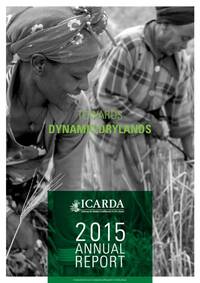ICARDA Annual Report 2015

Authors:
The year 2015 will be remembered for the waves of refugees from the Middle East and North Africa (MENA) region looking for a safer future in other parts of the world. While millions of people crossed into Europe, the international community looked for the roots causes of the migration, recognizing that food insecurity, unemployment, drought and environmental degradation all play a role in the uprising and coalescing of conflict.
ICARDA’s work in the severely food-and water-stressed MENA countries puts it in a strong position to contribute to stability in the region. The decades of research and the knowledge we have generated with our partners on drought management, agricultural productivity and natural resources will continue to bear fruit and build more resilient communities. In 2015, we have become more focused on consolidating our efforts with our stakeholders in the affected regions and beyond so we can scale out proven technologies for wider impact.
2015 made history when ICARDA became the first organization ever to withdraw its seed collection from the Svalbard Global Seed Vault, the world’s backup facility for storing seeds. The mission, executed with support from the Global Crop Diversity Trust and CGIAR, drew tremendous international attention. The seed collection, originally housed in Aleppo, Syria, has been replicated amid the crisis and is now safely stored in our new state-of-the-art genebanks in Lebanon and Morocco. We extend deep gratitude to all our national partners, particularly in Egypt, Ethiopia, India, Jordan, Lebanon, Morocco and Turkey, for their extensive support in keeping the dryland’s rich natural heritage alive and safe. Also, we applaud ICARDA’s team of managers, researchers and technicians, and our colleagues in Syria, without whom our transition would not have been possible.
ICARDA’s dynamic mix of strategies based on solid science addresses crop yields, water efficiency, the management of droughts and land degradation, livestock productivity, as well as socio-economics and policy. The strategies aim to respond to the enormous challenges in setting up efficient and effective agricultural and rural production systems in the dry areas.
Our outcomes in 2015 further add to the body of evidence that demonstrates a clear potential and path towards productive and climate-resilient livelihoods for smallholders and livestock producers – a road towards 'Dynamic Drylands' – the theme of ICARDA’s 2015 Annual Report, which we proudly present.
In Ethiopia, for example, the improved legume varieties developed as a result of our research partnership with the NARS are turning around the country’s declining trend in food legumes production. Higher yields encourage farmers to plant more legumes for domestic consumption and exports to Sub-Saharan Africa and the Middle East. In addition, heat-tolerant wheat varieties continue to transform agrarian landscapes in hot countries, such as Sudan, Nigeria, Senegal and Mauritania, where wheat was never considered as a viable major crop.
And-in 2015-ICARDA took big strides in assisting women to become equal stakeholders in the burgeoning wheat value chains in these countries. Rural communities suffering from long periods of conflict is the tough reality in many places where ICARDA works. We made heartening progress in supporting rural women in Afghanistan through village-based seed enterprises – a model approach to facilitate women entrepreneurship and empowerment.
In Tunisia and Ethiopia, we started new meat value chain initiatives with communities in marginal areas, which are going to be key in building their resilience as climate change worsens the scenario for farming.
ICARDA’s 2015 Annual Report, 'Towards Dynamic Drylands' showcases some impacts and innovations achieved in 2015 with support from our donors, global collaborators and NARS partners in different countries. We invite you to browse through the stories and see how the efforts of ICARDA and its partners are paying off.
